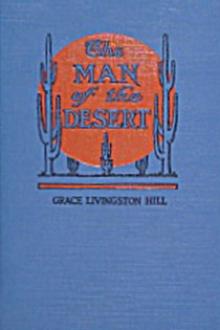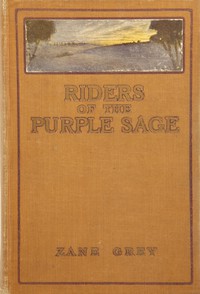The Desert of Wheat, Zane Grey [good non fiction books to read .TXT] 📗

- Author: Zane Grey
Book online «The Desert of Wheat, Zane Grey [good non fiction books to read .TXT] 📗». Author Zane Grey
Had there ever in all the years of the life of the earth been so perfect a day? How dazzling the sun! What heavenly blue the sky! And all beneath so gold, so green! A lark caroled over Lenore's head and a quail whistled in the brush below. The brook babbled and gurgled and murmured along, happy under the open sky. And a soft breeze brought the low roar of the harvest fields and the scent of wheat and dust and straw.
Life seemed so stingingly full, so poignant, so immeasurably worth living, so blessed with beauty and richness and fruitfulness.
"Lenore, your eyes are windows—and I can see into your soul. I can read—and first I'm uplifted and then I'm sad."
It was he who talked and she who listened. This glorious day would be her strength when the—Ah! but she would not complete a single bitter thought.
She led him away, up the slope, across the barley-field, now cut and harvested, to the great, swelling golden spaces of wheat. Far below, the engines and harvesters were humming. Here the wheat waved and rustled in the wind. It was as high as Lenore's head.
"It's fine wheat," observed Dorn. "But the wheat of my desert hills was richer, more golden, and higher than this."
"No regrets to-day!" murmured Lenore, leaning to him.
There was magic in those words—the same enchantment that made the hours fly. She led him, at will, here and there along the rustling-bordered lanes. From afar they watched the busy harvest scene, with eyes that lingered long on a great, glittering combine with its thirty-two horses plodding along.
"I can drive them. Thirty-two horses!" she asserted, proudly.
"No!"
"Yes. Will you come? I will show you."
"It is a temptation," he said, with a sigh. "But there are eyes there. They would break the spell."
"Who's talking about eyes now?" she cried.
They spent the remainder of that day on the windy wheat-slope, high up, alone, with the beauty and richness of "Many Waters" beneath them. And when the sun sent its last ruddy and gold rays over the western hills, and the weary harvesters plodded homeward, Lenore still lingered, loath to break the spell. For on the way home, she divined, he would tell her he was soon to leave.
Sunset and evening star! Their beauty and serenity pervaded Lenore's soul. Surely there was a life somewhere else, beyond in that infinite space. And the defeat of earthly dreams was endurable.
They walked back down the wheat lanes hand in hand, as dusk shadowed the valley; and when they reached the house he told her gently that he must go.
"But—you will stay to-night?" she whispered.
"No. It's all arranged," he replied, thickly. "They're to drive me over—my train's due at eight.… I've kept it—till the last few minutes."
They went in together.
"We're too late for dinner," said Lenore, but she was not thinking of that, and she paused with head bent. "I—I want to say good-by to you—here." She pointed to the dim, curtained entrance of the living-room.
"I'd like that, too," he replied. "I'll go up and get my bag. Wait."
Lenore slowly stepped to that shadowed spot beyond the curtains where she had told her love to Dorn; and there she stood, praying and fighting for strength to let him go, for power to conceal her pain. The one great thing she could do was to show him that she would not stand in the way of his duty to himself. She realized then that if he had told her sooner, if he were going to remain one more hour at "Many Waters," she would break down and beseech him not to leave her.
She saw him come down-stairs with his small hand-bag, which he set down. His face was white. His eyes burned. But her woman's love made her divine that this was not a shock to his soul, as it was to hers, but stimulation—a man's strange spiritual accounting to his fellow-men.
He went first into the dining-room, and Lenore heard her mother's and sisters' voices in reply to his. Presently he came out to enter her father's study. Lenore listened, but heard no sound there. Outside, a motor-car creaked and hummed by the window, to stop by the side porch. Then the door of her father's study opened and closed, and Dorn came to where she was standing.
Lenore did precisely as she had done a few nights before, when she had changed the world for him. But, following her kiss, there was a terrible instant when, with her arms around his neck, she went blind at the realization of loss. She held to him with a savage intensity of possession. It was like giving up life. She knew then, as never before, that she had the power to keep him at her side. But a thought saved her from exerting it—the thought that she could not make him less than other men—and so she conquered.
"Lenore, I want you to think always—how you loved me," he said.
"Loved you? Oh, my boy! It seems your lot has been hard. You've toiled—you've lost all—and now…"
"Listen," he interrupted, and she had never heard his voice like that. "The thousands of boys who go to fight regard it a duty. For our country!… I had that, but more.… My father was German… and he was a traitor. The horror for me is that I hate what is German in me.… I will have to kill that. But you've helped me.… I know I'm American. I'll do my duty, whatever it is. I would have gone to war only a beast with my soul killed before I ever got there.… With no hope—no possibility of return!… But you love me!… Can't you see—how great the difference?"
Lenore understood and felt it in his happiness. "Yes, Kurt, I know.… Thank God, I've helped you.… I want you to go. I'll pray always. I believe you will come back to me.… Life could not be so utterly cruel…" She broke off.
"Life can't rob me now—nor





Comments (0)